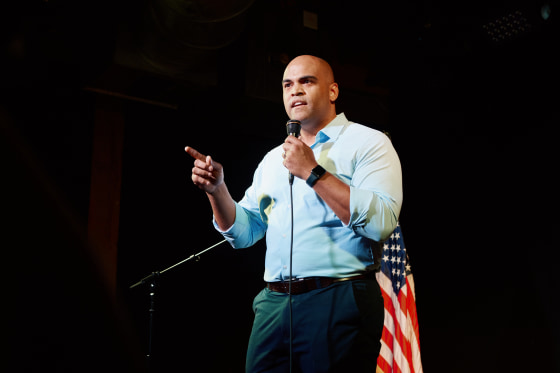Democratic Rep. Colin Allred did not mince words when he faced off against Republican Sen. Ted Cruz in the first and only Texas Senate race debate earlier this month. He called Cruz out for his anti-abortion stance, his decision to take a Cancún vacation during Texas’ historic winter storm in 2021, and his comments on the Jan. 6 Capitol attack.
“I took off my suit jacket and I was prepared to defend the House floor from the mob,” Allred said, recalling the Jan. 6 attack. “At the same time, after he’d gone around the country lying about the election, after he’d been the architect of the attempt to overthrow that election, when that mob came, Sen. Cruz was hiding in a supply closet.”
Cruz, who laughed off the assertion from across the stage, did not address Allred’s claim and did not respond to NBC News’ request for comment.

Allred, a three-term Dallas congressman, is out to unseat Cruz in the Republican stronghold of Texas. While Cruz has adopted the slogan “Keep Texas, Texas,” Allred is hoping to lure voters into a new way of leadership, he says, one that focuses on reaching across the aisle and getting to the bottom of hot-button issues like abortion, the border and the economy. The close Senate race is a nod to the high stakes of the presidential battle between former President Donald Trump and Vice President Kamala Harris. But the Allred-Cruz showdown is also one of several sleeper races that could determine which party gains control of the House or Senate — both chambers are up for grabs. Texas may be Democrats’ best chance to maintain control of the Senate, with some polls showing Cruz lead within the margin of error. The outcome of this race will influence Congress and have a major impact on the next president’s efficacy.
Allred, a 41-year-old civil rights lawyer, had a career in football, earning a full scholarship to Baylor University in Waco, Texas, and eventually playing for the Tennessee Titans, before turning to politics. In 2018, he defeated Republican incumbent Rep. Pete Sessions in a stunning upset for Texas’ 32nd Congressional District and became the first Democrat to ever represent the district.
Now, Allred is attempting to make history again as the first Democrat to win a statewide office in 30 years, even if polls have consistently shown Cruz with a slight lead.
“What we’ve been focused on from the very beginning is trying to run a campaign that can be for every Texan. It’s a reflection of how I want to serve, which is for all 30 million of us,” Allred said to NBC News earlier this month.
The Democrat has painted Cruz as an extremist who has done little to nothing for his constituents during his two terms in the Senate, while Cruz has criticized Allred’s stance on transgender rights — he voted for the Equality Act to codify protections for LGBTQ Americans and has condemned discrimination against transgender people — and his immigration policies — he’s supported legal pathways to citizenship for young undocumented immigrants known as Dreamers, and efforts to speed up the asylum process. Cruz said Allred is nothing like the “charismatic” Beto O’Rourke he defeated in 2018 by less than 3 percentage points.


Jen Ramos, a member of the Texas Democratic Party’s governing executive committee, is among critics who say that, although she plans to vote for Allred, she believes he has spent too much time catering to moderate voters and not enough appealing to his own base.
“My criticisms have come from a place of, ‘He’s not allowing himself to get to know people and meet Texans where they’re at,’” Ramos told NBC News in an interview. She said that she saw a different side of Allred at Harris’ rally in Houston on Saturday.
“When people do get to know who he is and when he does give himself the opportunity to actually talk to people, meet them where they’re at, they are impressed and very aware of the polar opposite he is to Ted Cruz,” Ramos said. “I think that in itself has shown some growth.”
Still, Allred’s supporters are optimistic about the progressive politician’s chances in such a close race. Immigration, the economy and abortion have been the hot-button issues throughout the Allred-Cruz battle. Along with vowing to support Dreamers and restore abortion access, Allred has a record of support for small businesses and has voted to raise the minimum wage.
But Allred, like some other Democrats running in states where abortion access has been severely restricted, has made reproductive rights the banner of his campaign. He has already co-sponsored or supported bills to allow abortion access before fetal viability and allow interstate travel for abortion care. During speeches, in ads, and on the debate stage, Allred has spoken about the importance of reproductive rights and condemned Cruz’s staunch anti-abortion rhetoric.
The Republican senator, meanwhile, has celebrated Roe v. Wade’s reversal, supported a right-wing attempt to ban emergency abortions across the country, co-sponsored a 20-week federal abortion ban and co-introduced a bill to allow states to exclude abortion providers from state Medicaid funding. The bills were unsuccessful.

Allred said he understands just how out of place his progressive policies may seem in a Republican stronghold like Texas.
“I look at every issue from the lens of, ‘Is this going to help people?’” Allred said. “I was raised by a single mother who was a public school teacher. I went to public schools here in Dallas. I’m a product of a village that it took to raise me.”
He credits his successes to “the folks who poured themselves into me,” he said in an interview.
He’s been forthcoming about his humble beginnings, routinely sharing stories of watching his single mother work two jobs to make ends meet. “I know what it’s like to swipe your debit card and say a little prayer,” he once said.
An appeal to moderates
Allred’s campaign strategy has centered around events and rallies with smaller audiences as well as ads — thanks to Allred’s staggering fundraising numbers. (He brought in $11.8 million in the first half of October compared to Cruz’s $9.9 million.) It’s prompted criticism from some political pundits who want to see a flashy, O’Rourke-style campaign complete with a social media takeover and lively events all over Texas. But others have said Allred’s slow-burn campaign is a winning strategy in a race that’s different from years past.
Matthew Bartlett, a Republican strategist, said Allred is running a strong campaign as a Texas Democrat. "But there are things that are out of his control that may determine this election," he said. "The biggest is that Texas is a red state and will most likely stay that way. He's running against some atmospheric pressures that are partisan."
This election, Allred has focused on luring moderate and swing voters. Even with his progressive politics, Allred has projected a moderate image and stressed that he’s willing to work across the aisle.
Bartlett said Allred’s decision to lean into bipartisanship is the right call in a slow-changing red state.
“If a Democrat were to win in Texas it would be a Democrat like him," Bartlett added. "Texas is changing. He’s running a good campaign, but ultimately it’s going to be very difficult for him to come across the finish line as a victor."
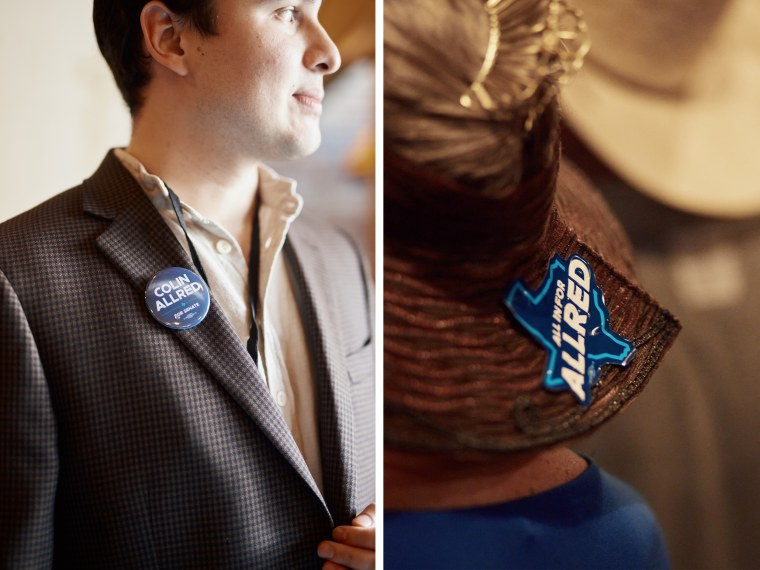
With the election around the corner, Allred has just a few weeks to make another appeal to undecided voters. He spoke about it in an interview after a recent phone-banking event in Dallas. The crux of his message is simple: to unite Texans across partisan divides.
“We’ve had a senator who is one of the most divisive in the entire country … he’s responsible for why our politics are where they are right now. Where you can’t even have a conversation at Thanksgiving.”
Allred's playbook
Those close to him say Allred is a gentle man with a kind word for anyone he meets.
“He’s the guy you want to go to when you’re having a hard time,” Allred’s wife, Aly Eber, said. “He’s the guy that listens, that understands.”
Allred and Eber met during law school when they were assigned to review each other’s papers in a Law of Democracy class. They quickly became friends and soon began dating. Years later, the couple has built their relationship on shared values; both champion women’s rights and served in the Obama administration.

But Allred has also seemed to fashion his bid for senator after his time on the football field, as a no-frills, no-nonsense team player. He was a linebacker and team captain during his time at Baylor. And when his teammates wanted to party and stay up late, he kept his mind on the field.
CJ Wilson, who played with Allred at Baylor before going to the Carolina Panthers and Dallas Cowboys, said Allred often reigned his college teammates in when they went offtrack.
“Colin became captain because he saw a hole and he wanted to fill it,” Wilson said.
“All of this is a replication of what he did in college and how he made it to the NFL,” Wilson said. “Colin is not the guy that wants to be out in the forefront. Colin is the guy that says, ‘If there’s a problem and it’s affecting or hurting people, I want to be the one to make it right.’”
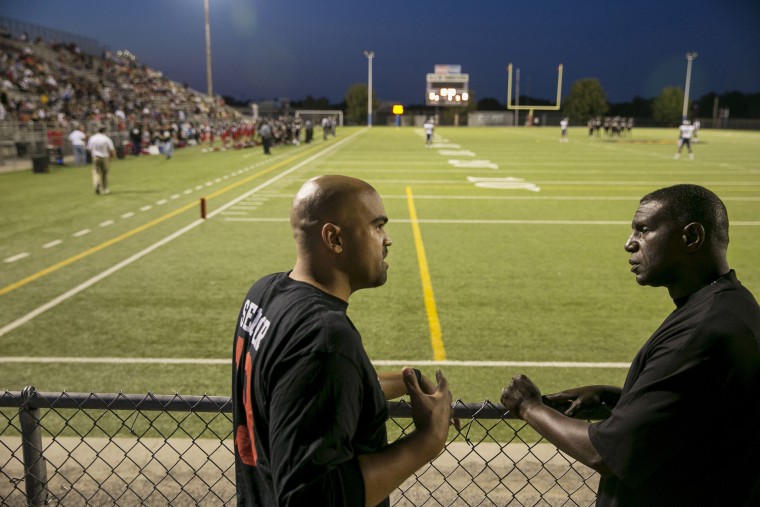
Allred has made a point of talking up his NFL past in a state where football is beloved, to say the least. He’s leaned into his story of being the son of a single mom who defeated the odds to make it to the NFL. It’s also proved to be a beneficial metaphor for casting Allred as a team player.
The Common Ground Committee, a nonprofit aimed at combating political polarization, named him one of the most bipartisan members of Congress. And, although his politics are pretty consistent, at times he has opposed his party on issues like the border — he has vowed to get to the bottom of illegal immigration while being “tough” on the border simultaneously.
A diverse coalition of supporters
On Oct. 5, supporters filled a Fort Worth bar wall-to-wall in a rally for the congressman. A line to enter the event stretched down the street, with people donning shirts with Allred’s face and quips about ousting Cruz. Allred’s supporters said they are most taken by Allred’s pro-choice stance, his support for teachers — the Texas State Teachers Association has endorsed him — and the overall possibility of change after two terms of Cruz in office.
“Colin will be a better representative than Ted Cruz. He’s already a great fit for Texas,” said Charles Clay, 76, of Fort Worth.
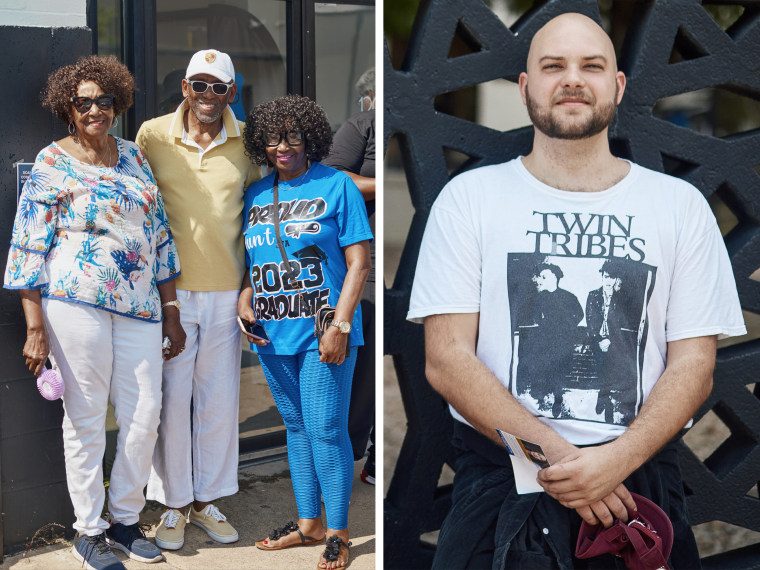
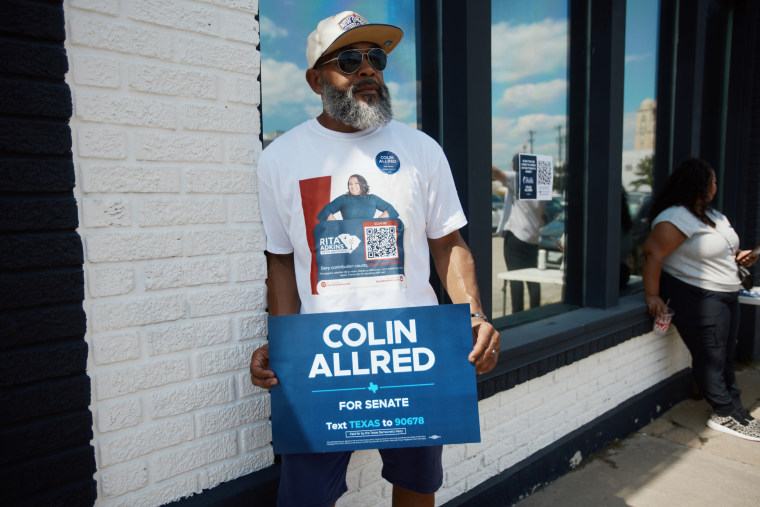
Rusty Shackleford, 31, of East Texas, said Allred is “taking Texas away from extremism, and placing it into purple state footing.”
Carolyn Bush, 73, of Everman, like many of Allred’s supporters, has latched on to the congressman’s zingers about sending Cruz to Cancun and away from the state office. “Ted Cruz does not support the real people of Texas. It’s time for him to move on, and I’m here to make sure he does just that,” she said.
The event at the bar drew a diverse crowd. There were groups of Black friends, Asian American supporters, a Latina mother with her children in tow, white women in colorful hats — all sharing an optimism about the upcoming election. And although Allred has not made his biracial identity a key component of his campaign, the significance of his race and his diverse base is not lost on him.
“My story is one of growing up as a Black kid in Texas who came home every night to a white family,” Allred said later at the phone-banking event in Dallas. “That’s given me some insight and empathy to understand some of the differences you see in our society, but also the similarities. What I’ve always tried to do is narrow those divides between us, not just by race but by all the factors that can divide you up in daily life.”
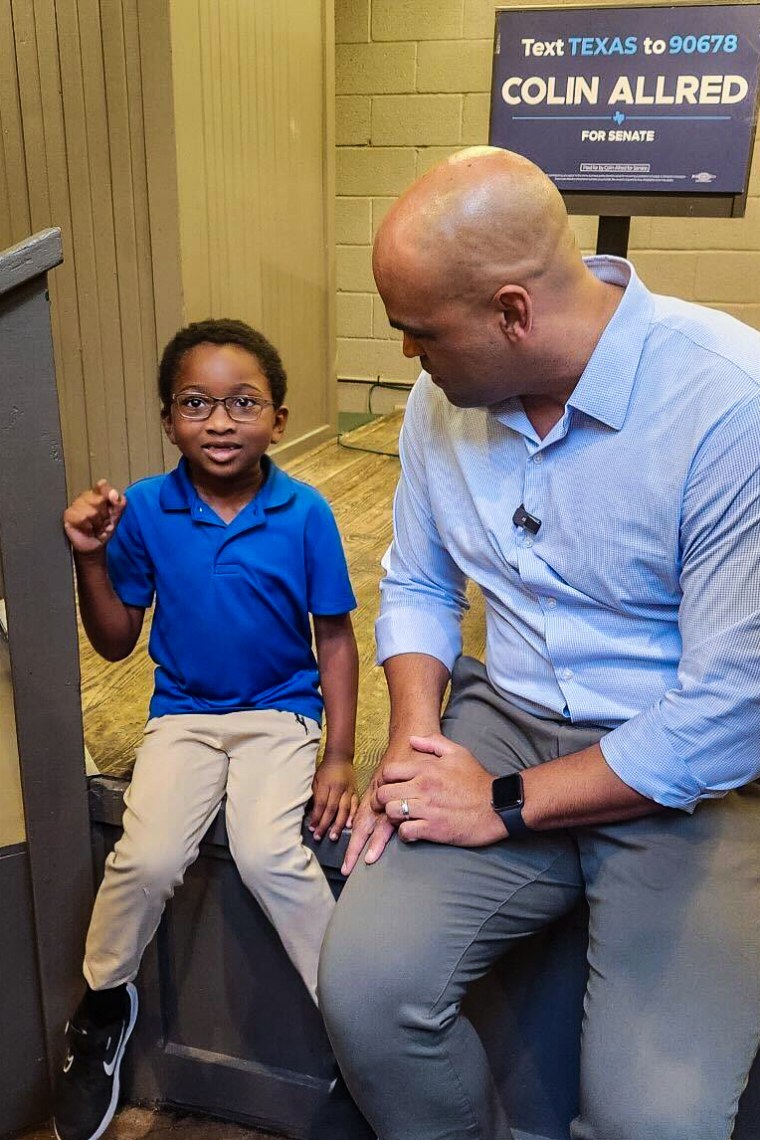
At the phone-banking event, Allred posed for pictures with 6-year-old Jerrin Norris, a little Black boy whose mother calls an “Allred stan.” Norris’ mother, Passion Jackson, 43, has immersed Norris in her civic engagement since he was a baby — taking him to volunteer on campaigns and at political events.
While he’s too young to vote, Norris made his opinion clear.
“The reason I like him,” Norris said, “is because he is the best one, and he wants to help our state and keep us safe!”
